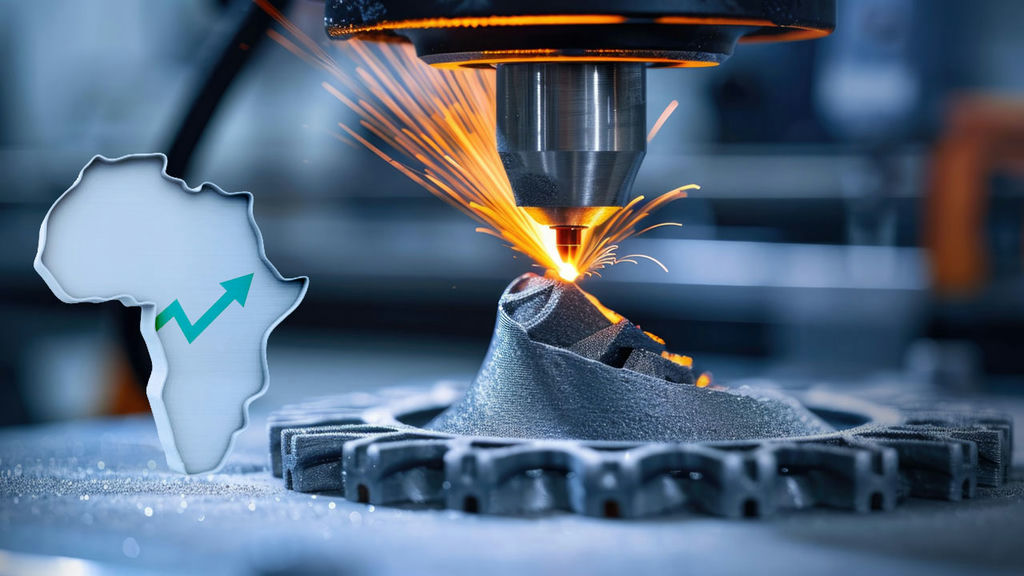
Additive manufacturing, often referred to as 3D printing, is an advanced manufacturing technology that is slowly but surely changing industrial production globally. While its adoption has gained significant traction in regions like Europe, America and Asia, Africa has only recently begun to recognize additive manufacturing’s value as a catalyst for economic development. The rise of additive manufacturing in Africa presents both opportunities and challenges that need to be addressed to unlock its full potential.
Additive manufacturing in Africa remains in its nascent stages, with limited adoption and infrastructure compared to more developed regions. According to a report in Manufacturing Review, between 2010 and 2018, 37% of industrial additive manufacturing systems were installed in North America, 28.4% in continental Europe, 30% in Asia and the Pacific, and 4.6% for the rest of the world. This disparity highlights the need for increased investment and support to accelerate the growth of additive manufacturing on the African continent.
One of the primary challenges facing additive manufacturing in Africa is the lack of access to technology and infrastructure. Many countries struggle with inadequate resources such as reliable electricity and stable high-speed internet connectivity, which are essential for running 3D printing operations effectively. Additionally, the high cost of equipment and materials creates a high entry barrier for small businesses and entrepreneurs looking to adopt this technology.
Despite the infrastructure and technology challenges, additive manufacturing holds immense promise for Africa, particularly in addressing the needs of small-scale manufacturing. Unlike traditional manufacturing methods which often require large-scale production facilities and significant upfront investments, additive manufacturing offers a more accessible and cost-effective way for businesses to sustainably manufacture small and medium-sized products, even with high levels of intricacy. This makes it well-suited for SMEs and local entrepreneurs seeking to innovate and produce customized products for niche markets.
The advantages of additive manufacturing for small-scale manufacturing in Africa are manifold. Firstly, it enables on-demand production, allowing businesses to quickly respond to changing market demands and pivot if they need to, with lower production and inventory costs. Secondly, it facilitates the localization of production, reducing reliance on imported goods and establishing opportunities for job creation and economic empowerment within local communities. Lastly, it empowers businesses to unleash their creativity, experiment with a variety of materials, and bring innovative products to market with minimal barriers to entry.
In terms of applications, additive manufacturing has vast potential across various industries in Africa. In healthcare, 3D printing can be used to produce affordable medical devices, prosthetics, and personalized implants tailored to individual patients’ needs. In agriculture, it can enable the fabrication of precision farming tools, irrigation systems, and equipment spare parts, enhancing productivity and sustainability. In education, it can support STEM education initiatives by providing hands-on learning experiences and promoting innovation and problem-solving skills among students. In industries like oil and gas, additive manufacturing technology can be utilized to manufacture components such as valves, impellers, and heat exchangers with optimized designs for improved performance and durability. Additive manufacturing also reduces inventory costs through the adoption of digital inventory systems and on-demand production, it reduces material wastage, and it allows for the consolidation of multiple parts into a single component, thereby reducing assembly time, minimizing weight, and improving overall reliability. The growth in interest with respect to additive manufacturing in Africa over the past few years is largely driven by the recognition of its transformative potential across these various industries and more.
One of the foremost adopters and proponents of industrial additive manufacturing technology in Africa, RusselSmith, has been very vocal about the opportunities that the technology can unlock, especially in industries like oil and gas, and marine. As a leading provider of integrated oilfield solutions in Nigeria and a member of the Manufacturers Association of Nigeria (MAN), RusselSmith has been at the forefront of the additive manufacturing movement in Nigeria.
Through strategic partnerships and investments in cutting-edge technology, RusselSmith has developed capabilities to design and sustainably manufacture custom components and tooling, using 3D printing techniques and materials such as metals and high-performance polymers. This has enabled the company to offer tailored additive manufacturing solutions to its clients, addressing specific challenges and improving their operational efficiency.
RusselSmith’s digital inventory solution is an example of the transformative potential of additive manufacturing for businesses in Nigeria and beyond, due to the increase in efficiency, improved uptime, and cost savings that can be realized from digitizing legacy parts and manufacturing them on demand.
In addition to its direct applications in oil and gas operations, RusselSmith has been actively involved in promoting awareness and education about additive manufacturing in Nigeria. The company is partnering with various additive manufacturing stakeholders to share knowledge and best practices related to 3D printing, fostering a culture of innovation and collaboration within the region’s energy and marine community and beyond.
As more industries adopt industrial additive manufacturing across Africa, it is expected that the follow-on effects such as creation of highly skilled jobs, improved small-scale manufacturing capacity, and enhancement of research and development will prompt more private sector investments and also cause governments across Africa to develop strategies for stimulating industrial growth through additive manufacturing.
Subscribe to AM Chronicle Newsletter to stay connected: https://bit.ly/3fBZ1mP
Follow us on LinkedIn: https://bit.ly/3IjhrFq
Visit for more interesting content on additive manufacturing: https://amchronicle.com
Since his postdoctoral days at MIT, Hang Yu, associate professor of materials science and engineering,…
Amritsar-based Amandeep Hospitals, in collaboration with Ujala Cygnus, has inaugurated North India’s first hospital-based 3D Printing and Virtual…
Engineers at The University of Texas at Austin are leading an academic and industry all-star…
For decades, aluminum has been the "golden child" of the automotive and aerospace sectors—lightweight, abundant,…
Columbia University engineers have successfully 3D-printed an ultrarealistic three-course meal using a novel laser cooking…
Digital Catapult has launched an accelerator program to strengthen the industrial supply chain resilience of…
This website uses cookies.